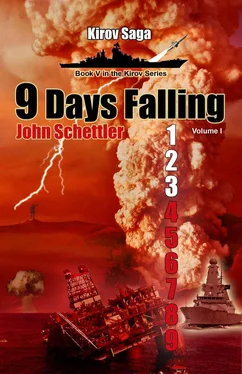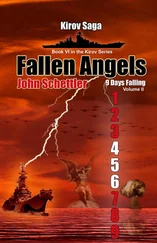Volsky smiled inwardly, elated that Fedorov had reached his destination safely. Now the only question was whether he could arrange his return. The events were mounting up in the Pacific, tension rising by the hour. The report he had received on the Tigr in the Gulf of Mexico was most disturbing, and he immediately called the commander of the Northern Fleet to see why the sub was sent there. The answer was equally disturbing, but not unexpected—Moscow had ordered it, ordered the deliberate destruction of one of the world’s largest offshore oil platforms, a facility critical to British Petroleum operations in the Gulf. And Moscow had ordered elements of the 58th Army to mobilize on the northern border of Kazakhstan as well. Moscow was holding a knife to all the vital energy centers the West depended on. He had little doubt that there would soon be an incident in the Persian Gulf as well.
Yet for the moment he had another problem, Gerasim Kapustin, Inspector General of the Russian Navy. He looked at the man, wondering how much he really knew and what he was hoping to determine with this meeting. He decided to say nothing and let the other man make the next move. Kapustin was only too happy to oblige.
“Care to explain that note?” he asked. “Care to explain what this Fedorov is doing on the Caspian coast, and how he could be seeking a man reported as killed in action during my inspection?”
Volsky fixed him with a level stare, still wondering what he might know. “I’m afraid that there are certain matters I am not at liberty to discuss, Inspector.”
“Yes, your Captain Karpov made that painfully clear the last time we spoke. Needless to say I took the liberty of discussing that note with someone who might know about this matter.”
“It was you who ordered my Lieutenant waylaid in the dark at the Naval Logistics building?” Volsky’s displeasure was obvious on his face.
“I’m afraid so.”
“Your duties aside, Inspector, that was highly inappropriate. The man was assaulted and drugged. I could have you arrested this very moment for admission of your culpability in the matter—yes, even you, Inspector General of the Russian Navy. Your mandate extends only so far, particularly now in time of imminent war. There are operations underway that you are not privy to, and you have interfered, rather violently, with a man who was operating under my direct orders.”
“That I have.” Kapustin raised his chin, ready for battle. “And I must tell you that I am here to interfere further, unless I receive a full explanation of this situation. What you say is true, Admiral. My mandate is limited, but I have friends, even as you do, and some of them are in positions of considerable power.”
“Let me repeat—” Volsky began, but Kapustin cut him off.
“Yes, Yes, you are going to pretend this is all very top secret. I was inclined to believe your Captain when he used that line before. So I took the matter to someone who is privileged to know of these secret things, and I have yet another letter for you, Admiral.” He reached into his pocket and handed Volsky another plain folded paper.
Volsky took it with some reluctance, wondering what was there. Could Kapustin have pushed this all the way to Moscow? Could he have rallied Suchkov to his side, or even the President or Prime Minister? Was he handing me orders from Moscow? He opened the paper and read the thin handwritten note silently.
“Admiral Volsky, I ask you to please enlighten Inspector General Kapustin as to the nature of your recent operations aboard the battlecruiser Kirov and the importance of the current operation now underway in the Caspian. You may find his cooperation essential.
- Pavel Kamenski, First Deputy Chairman, KGB, Ret.”
“I was to give you one thing more,” said Kapustin, producing a faded photograph and handing it to the Admiral.
Volsky took the photo, his brows raising with surprise when he saw it. It was immediately clear to him what had happened now. Kapustin kept digging and when he managed to get hold of Fedorov’s letter he decided the mystery was now beginning to touch upon dangerous information, hidden secrets, black operations, shadows he was not accustomed to lighting with the flashlight of his diligent mind and work. Volsky knew the man was close to Kamenski, and it was no surprise that he went to him with this. Apparently Kamenski knew more about Kirov that anyone realized. The Admiral stared at the photograph, breathing deeply.
“Kamenski gave you this?”
“He did.”
“And did he tell you where he found this photo?”
“Oh, I asked him, but he would not reveal those details. It was enough for him to assure me as to its authenticity, and I can tell you that was more than enough for me to grasp at that moment. I must say that I found it hard to believe, and so Kamenski advised me to have this discussion with you, before things get out of hand, as he put it, and put the matter to rest.”
“Things were already getting out of hand,” said Volsky, with just a touch of anger. “I will assume your Captain Volkov was responsible for delivering Fedorov’s note to you in the first place.” He leaned forward, leveling a finger at Kapustin. “If you think you can rely on men like that from Naval Intelligence to do your dirty work, Kapustin, I will tell you that I have men of my own to command, men of war. I will not hesitate to use the full power and authority of my position to see that my operations are not compromised in any way.”
“Admiral Volsky…” Kapustin held out a hand, placating the Admiral. “I am not here to quarrel with you, and for the methods I used to obtain that letter, I apologize to you here and now. It will not happen again. As for Captain Volkov, yes, he can be difficult to manage at times. Kamenski and I have sent him off on a wild goose chase to keep him busy. He is riding the Trans-Siberian rail line, checking every depot from here to the Caspian Sea, and will be of no further bother to you. But Admiral—that photograph—imagine my shock and surprise! I am a man accustomed to keeping my feet firmly on the ground. Numbers, reports, photographs—yes, I have piles and piles of them. But when I saw that one, my entire world turned upside down, and I must tell you that I was given the choice of either believing what my eyes were telling me or considering myself insane. Can you help me answer that question?”
“What else has Kamenski told you?”
“Wasn’t that enough? Please, Admiral—is that photo authentic, or am I a lunatic?”
Volsky thought for a good long time, watching Kapustin and wondering what else he might already know. Pavel Kamenski had been one of the most powerful operatives of the KGB in the decades leading up to the demise of the old Soviet Union. He survived the dissolution of that organization and was instrumental in seeing its services parceled off to other agencies like the Federal Protective Service, the Foreign Intelligence Service and the GRU. Volsky had long wondered what the Soviet and the Russian governments after it had learned about Kirov . After all, they had nearly eighty years to ruminate on information they may have uncovered as a result of Kirov’s astounding sorties to the 1940s.
He looked at Kapustin, considering, then nodded. “Very well, Inspector. I will tell you about this photograph, if you care to listen, and then you will be kind enough to answer a few questions for me.”
“Deal,” said Kapustin, sitting up in his chair, obviously interested.
Volsky leaned forward, placing the photograph on his desk and tapping it with his finger. “If you must know, then I will consider enlightening you, Inspector—on one condition.”
“Name it.”
“I want to meet with Kamenski.”
Читать дальше












